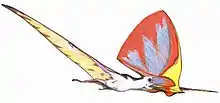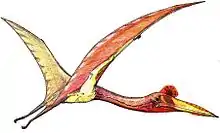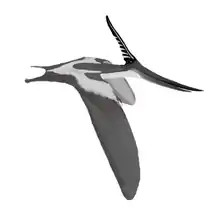Forfexopterus
Forfexopterus (meaning "scissor wings") is a genus of ctenochasmatid pterosaur from the Early Cretaceous Jiufotang Formation in China.[1] It contains a single species, F. jeholensis.
| Forfexopterus | |
|---|---|
| Scientific classification | |
| Kingdom: | Animalia |
| Phylum: | Chordata |
| Order: | †Pterosauria |
| Suborder: | †Pterodactyloidea |
| Family: | †Ctenochasmatidae |
| Genus: | †Forfexopterus Jiang et al., 2016 |
| Species: | †F. jeholensis |
| Binomial name | |
| †Forfexopterus jeholensis Jiang et al., 2016 | |
Discovery and naming
The holotype specimen of Forfexopterus was discovered by a local farmer, who had partially damaged this specimen while attempting to remove the encasing rock; the specimen was later restored. The specimen, which has the number HM V20, represents a single individual, and consists of a mostly complete skeleton including the skull but missing most of the vertebral column.[1] It was discovered in rocks belonging to the Jiufotang Formation, dating to approximately 120 million years ago (Aptian), and it was described in 2016.[1][2]
The generic name Forfexopterus is derived from Latin forfex ("scissors") and Greek pterus ("wings"); the specific name jeholensis refers to the Jehol region.[1]
Description
Forfexopterus would have been large for an archaeopterodactyloid. The skull was low and long, measuring 510 millimetres (20 in) in length; it appears that no crest was present on either jaw. Forfexopterus is unique among archaeopterodactyloids in that the first phalanx bone of the wing finger was shorter than the second but longer than the third. In addition, it exhibits a unique combination of traits: it has in total approximately 120 long, slender teeth, which span from the tip of the jaw to 1/3 along the length of the skull (stopping before the nasoantorbital fenestra); the crest on the sternum, known as the "cristospine", is long; the location where the coracoid attaches to the sternum is further forward on the right side than the left; and the coracoid bears a flange.[1]
Classification
While no phylogenetic analysis was conducted, the authors determined that Forfexopterus was a member of the Archaeopterodactyloidea, on account of the long fourth metacarpal and the reduced fifth metatarsal. They tentatively assigned it to the Ctenochasmatidae based on the long snout, the presence of more than 100 teeth, the third metatarsal of the foot being longer than a third of the tibia, and the presence of projections called exapophyses on the vertebrae.[1]
References
- Jiang, S.; Cheng, X.; Ma, Y.; Wang, X. (2016). "A new archaeopterodactyloid pterosaur from the Jiufotang Formation of western Liaoning, China, with a comparison of sterna in Pterodactylomorpha". Journal of Vertebrate Paleontology. 36 (6): e1212058. doi:10.1080/02724634.2016.1212058.
- He, H.Y.; Wang, X.L.; Zhou, Z.H.; Wang, F.; Boven, A.; Shi, G.H.; Zhu, R.X. (2004). "Timing of the Jiufotang Formation (Jehol Group)in Liaoning, northeastern China, and its implications". Geophysical Research Letters. 13 (12): L12605. doi:10.1029/2004GL019790.













